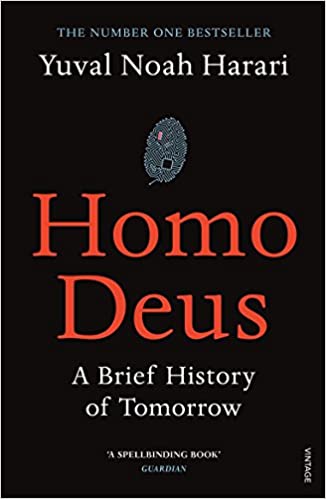“Dataism” as a Religion of the Future
Written by Cami Ismanova.
How would you like to travel to the future, and if you could, what would you expect to see? The first president of the Martian Federation, Mr. Musk? People driving flying Tesla cars? A robot cooking your omelet? Or maybe melting icebergs at the North Pole turning our cities into new Atlantises? Will mankind still be dominant or even relevant then? Will humans still be at the top of the food chain using their immense power to create and destroy? Will people evolve into “homo deus” – human gods – or will they perish like the other living things they have eradicated?
Yuval Noah Harari, an Israeli professor of history at the Hebrew University in Jerusalem, is already well known for his bestselling books Sapiens: A Brief History of Humankind andHomo Deus: A Brief History of Tomorrow. In his latest work, Homo Deus, he highlights possible future scenarios and trends that are likely occur. Among these possibilities are the rise of super humans, the reign of AI, space colonization, and “Dataism” as a new emerging religion.
I would like to focus on “Dataism” in particular here. The term is so new that my laptop does not even recognize it. Basically, it is a new philosophy that elevates the significance of big data. What is this “data” and why is it “big,” you might ask? The data being referred to here is an enormous amount of information collected through social media, mobile data, and elsewhere on the web, ultimately culminating in trillions of records. Every voice message you have sent, every click on a website you have ever made, every time you have liked boring photos of quotes on Instagram, and every financial transaction you have ever made – these all become a part of big data. I am not telling you this to make you paranoid. It is just what it is: bits of information traveling back and forth within seconds and flowing like endless ripples in an ocean of data.
Why does “Dataism” have such obvious potential? This is because big data has already infiltrated our daily life in so many aspects, including education, finance, technology, transportation, medicine, economics, and even politics. One of the main ideas of Homo Deus isthat mankind will willingly provide all this information because it will be mutually beneficial. AI and big data might improve life in ways that are hard to imagine. Nowadays, social media can already tell you more about your preferences than you can yourself. How? By collecting and evaluating the data you provide, as well as by monitoring your physical and mental health through your mobile phones and smart watches. Demonstrating what is already possible with big data, Google can predict an upcoming seasonal outbreak of the flu earlier than any other medical institution that has been formed solely for predicting outbreaks of the flu. Big data is everywhere already. It is fascinating and terrifying at the same time.
Overall, the book Homo Deus is intriguing! It discusses actual trends that, although still in the early stages of development, have the potential to grow rapidly in future decades. The book’s insights will make you think outside of the box and realize possible future scenarios. For better historical and social insights, I highly recommend reading the first book Sapiens beforehand, and then diving into Homo Deus to get a fresh dose of mind-blowing information afterwards.
The Author
Cami Ismanova is a student at Chonnam National University, majoring in economics. She loves listening to jazz, traveling, and reading. These days, she is into growing flowers and drawing with gouache. She is interested in topics that are related to the environment and living a healthy lifestyle. Instagram: @camidisman







